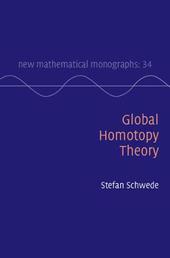
|
Global Homotopy Theory
Hardback
Main Details
| Title |
Global Homotopy Theory
|
| Authors and Contributors |
By (author) Stefan Schwede
|
| Series | New Mathematical Monographs |
|---|
| Physical Properties |
| Format:Hardback | | Pages:846 | | Dimensions(mm): Height 235,Width 158 |
|
| Category/Genre | Algebra |
|---|
| ISBN/Barcode |
9781108425810
|
| Classifications | Dewey:514.24 |
|---|
| Audience | | Professional & Vocational | |
|---|
| Illustrations |
Worked examples or Exercises
|
|
Publishing Details |
| Publisher |
Cambridge University Press
|
| Imprint |
Cambridge University Press
|
| Publication Date |
6 September 2018 |
| Publication Country |
United Kingdom
|
Description
Equivariant homotopy theory started from geometrically motivated questions about symmetries of manifolds. Several important equivariant phenomena occur not just for a particular group, but in a uniform way for all groups. Prominent examples include stable homotopy, K-theory or bordism. Global equivariant homotopy theory studies such uniform phenomena, i.e. universal symmetries encoded by simultaneous and compatible actions of all compact Lie groups. This book introduces graduate students and researchers to global equivariant homotopy theory. The framework is based on the new notion of global equivalences for orthogonal spectra, a much finer notion of equivalence than is traditionally considered. The treatment is largely self-contained and contains many examples, making it suitable as a textbook for an advanced graduate class. At the same time, the book is a comprehensive research monograph with detailed calculations that reveal the intrinsic beauty of global equivariant phenomena.
Author Biography
Stefan Schwede is Professor in the Mathematical Institute at the Rheinische Friedrich-Wilhelms-Universitat Bonn. His main area of expertise is algebraic topology, specifically stable homotopy theory.
Reviews'This elegant monograph develops the theory of global equivariant spectra from scratch, discusses a wealth of interesting examples, and will no doubt be a catalyst for exciting developments in equivariant topology.' Gregory Z. Arone, Mathematical Reviews Clippings
|